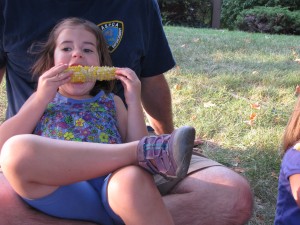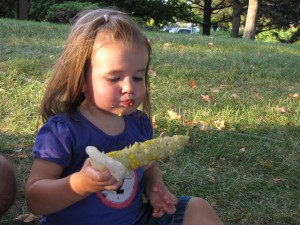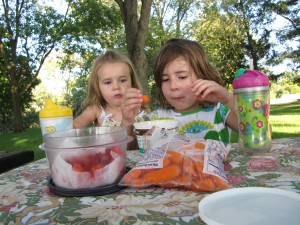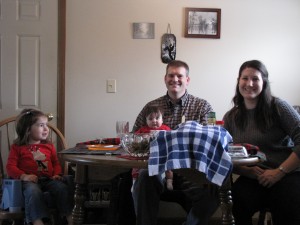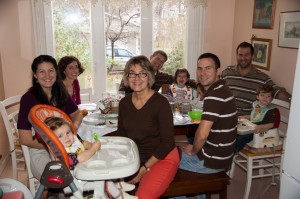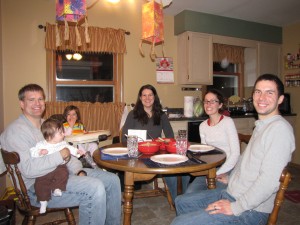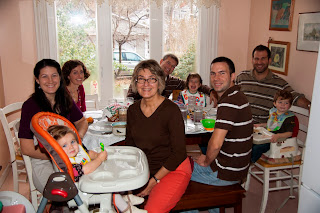This is an essay that was featured on (in)courage’s Bloom Book Club Facebook page a few weeks ago. Those who were featured were asked to also post these essays on our blogs this week and link up with everyone else on the Bloom website. For those who have already read this essay once, I’ve added some pictures and a few links if you would like to read again. For those who have not read this essay yet, welcome!
My girls love to eat.
By “love to eat”, I mean that they are mildly obsessed with eating. It is, in fact, difficult to get them to stop at times.
When I was in the hospital, having just given birth to my second girl, my dad called me around lunchtime. “Analise has had two sandwiches, some yogurt, a bunch of grapes, a banana, and some applesauce and she says she’s still hungry.” “Cut her off! Cut. Her. Off.” was my gracious response.
I am grateful that I do not have to deal with picky eaters, and at the same time I wonder how to get my girls to slow down, to enjoy the act of eating more rather than simply inhaling as much food as possible.
It is so easy to fragment my life between sacred and secular, and eating would seem to fall into the latter category. Eating is, after all, a physical necessity, a way to sustain our bodily functions.
Yet God wants to knit the secular places of my life back into the sacred.
Love the Lord your God with all your heart and with all your soul and with all your strength. These commandments that I give you today are to be upon your hearts. Impress them upon your children. Talk about them when you sit at home and when you walk along the road, when you lie down and when you get up.
Brother Lawrence, the dishwashing monk says:
The time of business does not differ with me from the time of prayer; and in the noise and clatter of my kitchen, while several persons are at the same time calling for different things, I possess God in as great a tranquility as if I were upon my knees at the blessed sacrament.
So how do I make eating into a deliberately sacred event rather than a piece of my day that has no connection with God?
I am learning that eating is linked over and over again to fellowship with and enjoyment of God.
In the story of the Prodigal Son, the Father celebrates the son’s return with a feast.
Jesus shares His last supper with his closest friends and then tells them that He will not drink again until He does it with us in heaven.
The image of a banquet, especially a wedding feast, is used several times to illustrate our enjoyment of God when we are finally with Him in body.
When we eat, we often are doing more than simply nourishing our bodies. We are sharing of ourselves with our family and our friends. This is sacred.
Perhaps eating is one of the last things that our culture hasn’t been able to take the sacred out of.
Our world tries hard to take God out of all that we do, to make everything a matter of utility. Yet when we share a meal with our family or with our friends, there is a sacredness there that is felt even by those who do not claim to follow God.
God created food. He created eating. When all is created, when all is love, then nothing is ordinary. Everything is sacred.
I cannot separate my life into ordinary parts and miraculous parts, into secular parts and sacred parts, into praising God parts and eating parts.
Without Christ, nothing was made that has been made. In Christ, all things hold together.
When we share a meal together, it is not ordinary, it is not solely of this world.
No matter how tempted I am to name something as mundane, as secular, it is not so.
Nothing that God has created is ordinary.
All is miracle. All is sacred.
There is nothing so secular that it cannot be sacred, and that is one of the deepest messages of the incarnation. ~ Madeleine L’Engle in Walking on Water
Art credit: Brother Lawrence in the Kitchen from a book published by Fleming Revell Co. in 1900.


